Festival Theaterformen 2018 "Watch & Write" - Milisuthando Bongela on the situation of cultural journalism on the African continent
Braunschweig, 7. Juni 2018
Whose culture is it?
by Milisuthando Bongela
“Why is my culture in a museum instead of on me?” This is question that informs all the work that I do. It is a sentiment that I return to whether I am writing, editing, reading, listening, filming, responding to or involved in any form of personal and professional cultural production. It is a kind of saudade around which my interest in archiving and documenting pivots. Without an interrogation of what constitutes the status quo for me as an African, a black person, a cisgender feminist woman, a worker, an English speaking person with a postcolonial and post-apartheid condition, I cannot begin to try to make sense of the myriad realities that constitute contemporary Africa. In other words, I cannot do my work.
All readings of the social, political, economic and environmental conditions of today and yesterday are rooted in this missing (of histories, lands, knowledges, cultures) and this informs my practice as a Cultural Journalist. Nobody has taught me this in a classroom. It is something that I have learned through 10 years of unsophisticated, unsupported, unfunded and unbridled practice. Herein lies the first problem with the practice of Cultural Journalism in Africa: It is not formally taught. It was only in November 2017 when I heard of the term “Cultural Journalism”, let alone use it, even though I have a degree in Journalism from the foremost journalism school in South Africa (Rhodes University). Why? After witnessing the dollar amount of institutional support / funding that Investigative, News, Business, Political and Health Journalism have within journalism and the public consciousness, I have come to learn just how comparatively un-institutionalised Cultural Journalism is, not just in Africa but around the world.
At an institutional level, there are endless programmes in Africa aimed at developing and supporting fiction and nonfiction writing. There are even a few schools for film, fashion and art but there is no established institution that develops writers and journalists purely for the role of Cultural Journalism. Within media institutions, where young journalists are practically trained, the beat of arts and culture is largely reduced to "entertainment", which in in recent history has been the synonym for celebrity based news that promote leisure based ‘"lifestyle"’ news and advertising fodder. There are virtually no formal places where journalists, storytellers and cultural workers can learn about the art of writing reviews, response, columns, humour, essays, music, photography, film and art, food, travel, criticism, esoterism and narrative writing for journalism. Add to this the skills of research, understanding policy and fund management and you have a loose framework for a would be curriculum.
The journalistic authority on cultural issues lies outside of Africa
The second issue with Cultural Journalism in Africa is a lack of definitive guidelines, standards and best practices that have been formulated, practiced and popularised as the standard or foundation. Cultural Journalism is a porous form of journalism that almost anybody with an opinion can enter and quickly become an expert in based on an inconsistent set of criteria. In all my years of working (and at times really struggling to be “good” at what I do because of no mentorship and no training) I have never had to ask what is Cultural Journalism and what is its role within the practice of journalism, within democracies and within national and cultural institutions?
Despite practicing Cultural Journalism outside of any formalised frameworks, since being introduced to the term, I have been thinking about the work that I do within the framework of this term and from there, able to see what questions we need to ask around its development as a profession.
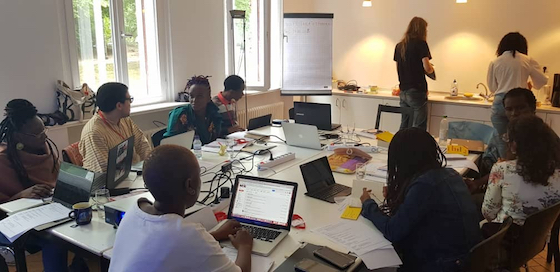 "Watch & Write" – journalists from African countries accompanying this year's festival
"Watch & Write" – journalists from African countries accompanying this year's festival
"Theaterformen" in Braunschweig © Ayodeji Rotinwa
One such question is who gets to be the authority on reporting culture in Africa? Who gets to set the standard for how reporting on culture in Africa should be done? There are a number of American and European owned, based and funded publications which cover arts news in Africa that are the current go to sites for news about arts and culture news in Africa. These are sites like OkayAfrica, Arts.Black, C& and Nataal and to some extent magazines like i-D. By global standards, these are quality websites in terms of the kind of content, curation and the writing. But they are not founded on and based on the continent. They provide spaces for relevant critique and reportage on the various scenes on the continent, but in a way that empowers journalist outside of Africa to be the the “first voices” or authorities on what is happening inside Africa. Or they hire local writers to either write the stories for these overseas websites or to be the fixers on stories by overseas journalists. What does this do to the idea of a subculture, community, movement or nation telling its own stories? What does this do to the professionalisation of cultural journalism on the continent?
Creating spaces for cultures to survive
Beyond questions related to the practice of journalism, what does an underdeveloped state of cultural journalism do to the preservation, value and the role of art in a society? Perhaps the greatest challenge regarding the arts and Africa, is not that we do not have enough funding for their development, it is that we have not successfully archived centuries worth of a continuous production of music, painting, sculpture, writing, architecture, photography, fashion, beauty, food and film. As such, we have not given value to the arts, even to ourselves as Africans. Most valuable collections of African art are in museums and private collections in other parts of the world - creating everlasting gaps between people on the continent (and diaspora) and their histories and heritages. When we invest in people whose role is to speak from the continent, about the continent, to the continent - we are investing in the closing of these gaps for generations to come.
And finally, returning to the question I initially posed "Why is my culture in museums and not on me?", does Cultural Journalism have a role in deconstructing subaltern experiences of the postcolonial and post-apartheid condition? Or should we just be reporting and reviewing? How do we help people understand themselves and their conditions better? Is that our role as Cultural Journalists? And does this responsibility also include modalities of cultural preservation? In a rapidly globalising world, ancient indigenous cultures are disappearing at an alarming rate as a result of knowledge holders dying, the success of cultural imperialism on the part of neo-liberal capitalism or because people simply do not care for indigenous cultures anymore Does Cultural Journalism have a role to play in creating spaces for cultures to survive?
When I started thinking about what I wanted to write about regarding Cultural Journalism in Africa, I had hoped to share some ideas about how to create networks for the development of Cultural Journalism on the continent. But I think it is more important to make a case for why there should be networks in the first place. Like any developing good idea, I am really enjoying the process of thinking out loud, together as we are doing at Watch & Write. I realise that whatever set of objectives is agreed upon by stakeholders who find these questions useful as a guideline for formalising Cultural Journalism in Africa, the steps to shifting the needle in a different direction need to be informed by first asking questions that educate us about where Cultural Journalism is today and where we want to take it tomorrow.
 Milisuthando Bongela (South Africa) is the arts and culture editor at Mail & Guardian and has won several prices for her work. At the moment she is working on a documentary film on black identity in Africa.
Milisuthando Bongela (South Africa) is the arts and culture editor at Mail & Guardian and has won several prices for her work. At the moment she is working on a documentary film on black identity in Africa.
Hier die deutsche Übersetzung dieses Artikels.
This text is a product of "Theaterformen" festival's journalistic project "Watch & Write" and is being published on nachtkritik.de in the context of a media cooperation with the festival. It is not part of the regular programme on nachtkritik.de.
Schön, dass Sie diesen Text gelesen haben
Unsere Kritiken sind für alle kostenlos. Aber Theaterkritik kostet Geld. Unterstützen Sie uns mit Ihrem Beitrag, damit wir weiter für Sie schreiben können.
mehr nachtkritiken
meldungen >
- 17. April 2024 Autor und Regisseur René Pollesch in Berlin beigesetzt
- 17. April 2024 London: Die Sieger der Olivier Awards 2024
- 17. April 2024 Dresden: Mäzen Bernhard von Loeffelholz verstorben
- 15. April 2024 Würzburg: Intendant Markus Trabusch geht
- 15. April 2024 Französischer Kulturorden für Elfriede Jelinek
- 13. April 2024 Braunschweig: LOT-Theater stellt Betrieb ein
- 13. April 2024 Theater Hagen: Neuer Intendant ernannt
- 12. April 2024 Landesbühnentage 2024 erstmals dezentral


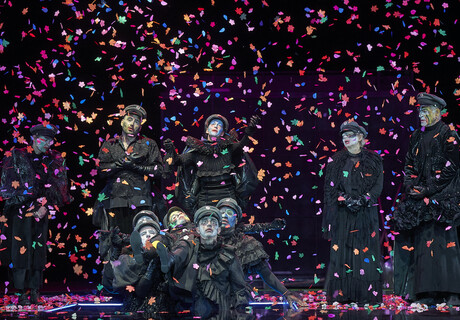
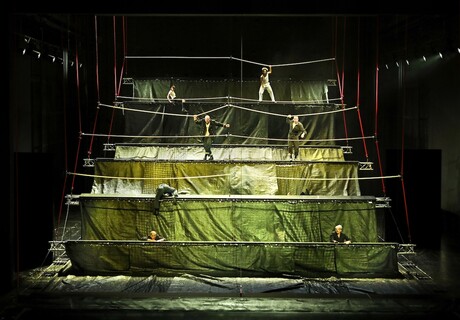

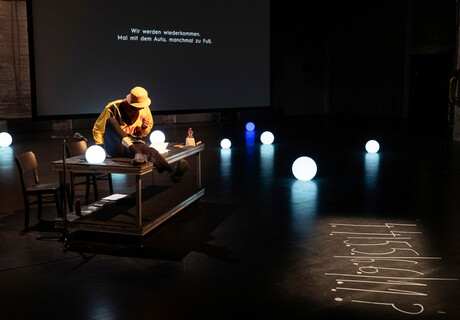
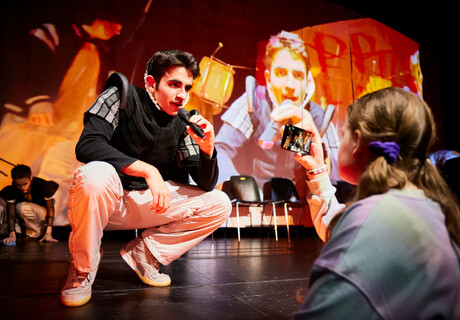
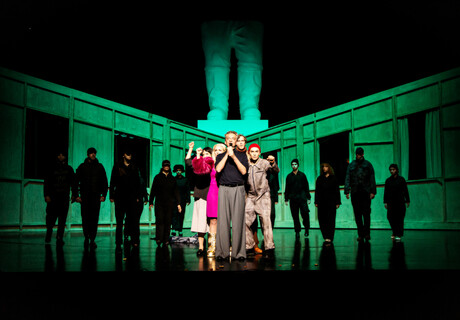

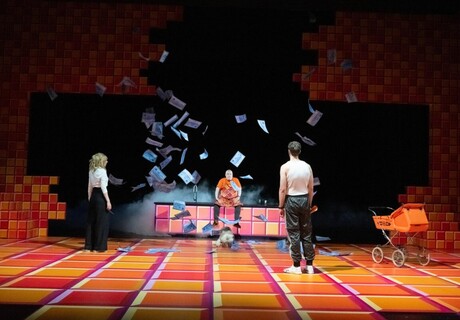
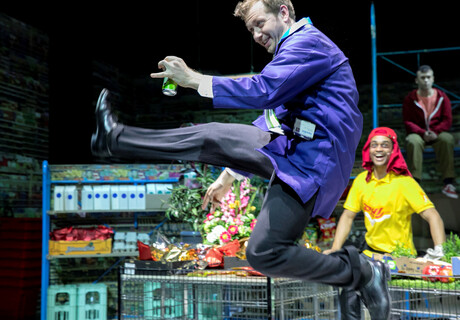
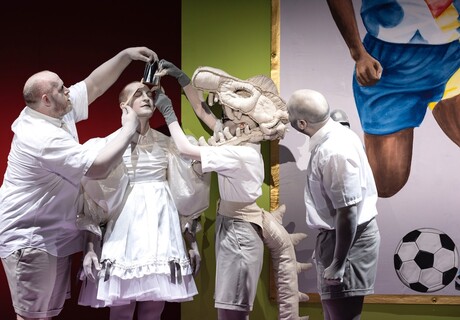
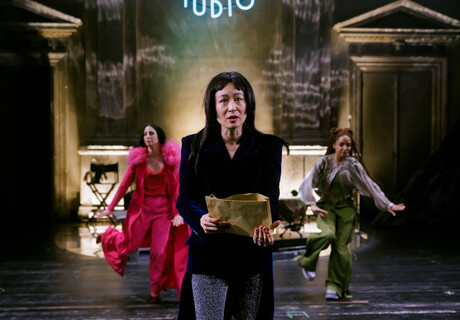
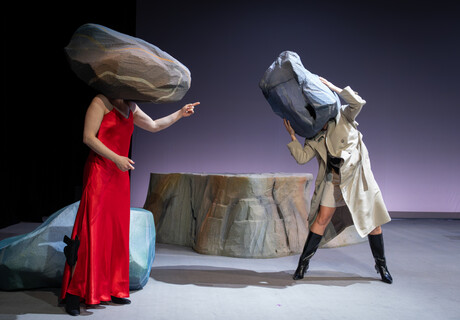
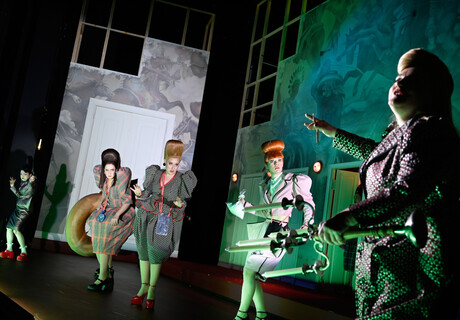
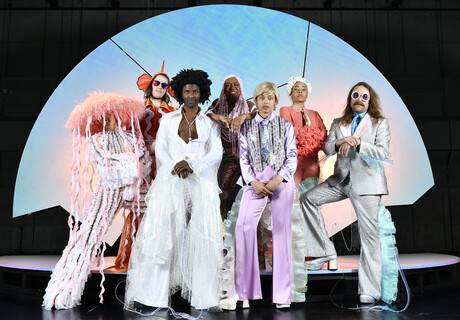
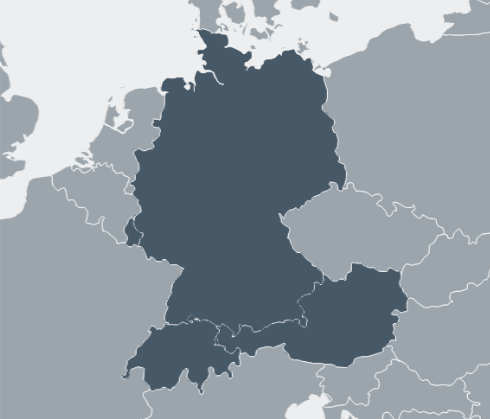
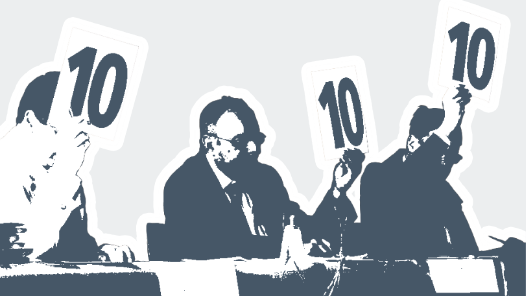
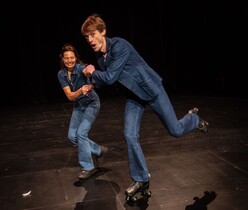



neueste kommentare >